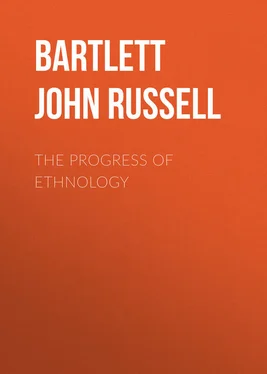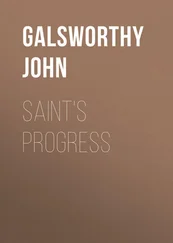John Bartlett - The Progress of Ethnology
Здесь есть возможность читать онлайн «John Bartlett - The Progress of Ethnology» — ознакомительный отрывок электронной книги совершенно бесплатно, а после прочтения отрывка купить полную версию. В некоторых случаях можно слушать аудио, скачать через торрент в формате fb2 и присутствует краткое содержание. ISBN: , Жанр: foreign_antique, foreign_prose, Историческая проза, на английском языке. Описание произведения, (предисловие) а так же отзывы посетителей доступны на портале библиотеки ЛибКат.
- Название:The Progress of Ethnology
- Автор:
- Жанр:
- Год:неизвестен
- ISBN:http://www.gutenberg.org/ebooks/35234
- Рейтинг книги:3 / 5. Голосов: 1
-
Избранное:Добавить в избранное
- Отзывы:
-
Ваша оценка:
- 60
- 1
- 2
- 3
- 4
- 5
The Progress of Ethnology: краткое содержание, описание и аннотация
Предлагаем к чтению аннотацию, описание, краткое содержание или предисловие (зависит от того, что написал сам автор книги «The Progress of Ethnology»). Если вы не нашли необходимую информацию о книге — напишите в комментариях, мы постараемся отыскать её.
The Progress of Ethnology — читать онлайн ознакомительный отрывок
Ниже представлен текст книги, разбитый по страницам. Система сохранения места последней прочитанной страницы, позволяет с удобством читать онлайн бесплатно книгу «The Progress of Ethnology», без необходимости каждый раз заново искать на чём Вы остановились. Поставьте закладку, и сможете в любой момент перейти на страницу, на которой закончили чтение.
Интервал:
Закладка:
Another scientific expedition has been sent out by the French Government to its West India colonies and the northerly parts of South America, under M. Charles Deville, a report from whom was read at a meeting of the Paris Academy of Sciences in June last. Its publication was recommended.
The French Government gave notice to the same Academy, at its meeting on the 31st August last, of an intended expedition by Lieut. Tardy Montravel, to the Amazon river and its branches, with the steamer Alecton and the Astrolabe corvette; and invited the Academy to prepare a programme with a view to facilitate the researches which M. de Montravel is charged to make.
Note. – The following is a list of the books relating to South America which have recently been published.
Historia fisica y politica de Chile segun documentos adquiredos en esta Republica durante doze anos de residencia en ella, y publicada bajo los auspicios del supremo gobierno. 7 livr. 8vo. with an Atlas of 27 plates. Paris. 1844.
Memoria geografico economico-politica del departmento de Venezuela, publicada en 1824 por el intendente de ejercito D. Jose M. Aurrecoechea, quien la reimprime con varias notas aclaratorias y un apendice. Quarto. Madrid. 1846.
Twenty-four years in the Argentine Republic, embracing the author's personal adventures, with the history of the country, &c. &c., with the circumstances which led to the interposition of England and France. By Col. J.A. King. 1 vol. 12mo. New York. 1846.
Travels in the interior of Brazil, principally through the northern provinces, and the gold and diamond districts, in 1836-1841. By George Canning. 8vo. London. 1846.
Travels in Peru, during the years 1838-1842, on the coast, and in the Sierra, across the Cordilleras and the Andes, into the primeval forests. By Dr. J.J. Tschudi. 2 vols. 12mo. New York. 1847.
Mr. Thomas Ewbank is preparing for the press a work on Brazil, being observations made during a twelve months' residence in that country. From a personal acquaintance with this gentleman, his reputation as a man of observation, and his well known capacity as a writer, we think a valuable book may be expected.
AFRICA
The zeal which was manifested a few years since for the discovery and exploration of the interior of Africa, and which seemed to have terminated with the Landers, and the unsuccessful voyage of the steamers up the Niger, has again shown itself, and we now find as much curiosity awakened, and as much zeal manifested for geographical discovery in this vast continent, and the solution of questions for ages in doubt, as has been exhibited at any former period.
The Travels of M. d'Abaddie, Dr. Beke, Isenberg, and others make known to us the immense extent and windings of the Bahr-el-Abiad and the Bahr-el-Azrek, or the white and blue Nile, but they have not yet been traced to their rise, and the solution of the question of the true source of the Nile, remains still unsettled.
We have received from Mr. Jomard, member of the French Institute, a work entitled "Observations sur le voyage au Darfour" from an account given by the Sheikh Mohammed-el-Tounsy, accompanied by a vocabulary of the language of the people, and remarks on the white Nile by Mr. Jomard. This is a valuable contribution to our knowledge of a portion of the interior of Africa, only known to us by the visit of Mr. Browne in 1794, and forms a link in the chain between Lake Tchad and a region of country quite unexplored, and of which we have no knowledge whatever.
We have some information of interest, relating to Senegal, communicated to the Royal Geographical Society of London, 24 24 Journal of the Geographical Society. Vol. 16.
being a narrative of Mr. Thomson, linguist to the Church Missionary Society at Sierra Leone, from that place to Timbo, the capital of Futah Jallo. His place is about four hundred miles northeast of Sierra Leone. "The principal object of the mission, was to open a road for a regular line of traffic through that country, between the colony and the negro states on the Joliba or Niger."
Mr. Thomson's narrative is full of interest and shows the great hardships to be encountered in effecting a communication with the interior. No man could be better prepared for such an enterprize, both by knowledge of the languages of the country, and the manners of the people; zeal, perseverance, and courage, also were prominent traits in his character; yet his enterprize failed and death cut him off, when on the point of starting for the eastward.
An expedition more successful in its results, has been undertaken in Dahomey on the Guinea coast, the particulars of which are given in the Journal of the Royal Geographical Society of London, (vol. 16.) This journey was performed by Mr. John Duncan, from Cape Coast to Whyddah, and from the latter about five hundred miles due north, through the Dahomey country to Adofoodiah. Although the king of Ashantee had refused permission for Mr. Duncan to pass through his territory, and had endeavored to prejudice the king of Dahomey against him, he was received with great kindness by the latter, and every facility given him to travel in his dominions. A guard of one hundred men was furnished to accompany him – a path was cleared for upwards of one hundred miles, and arrangements made so that at every village through which he passed, provisions were always waiting, ready cooked for them. Among the strange things seen by this traveller was a review of six thousand Female troops, well armed and accoutred. Their appearance, for an uncivilized nation, was surprising, and their performance still more so. The slave trade is carried on extensively in Dahomey. In the market of Adofoodiah, articles from the Mediterranean, and from Bornou in the interior were exposed for sale, showing the immense extent of the trade of the country. He met people from Timbuctoo and gathered some particulars of that remarkable city, as well as some information respecting Mungo Park's death. This enterprising traveller has lately been provided with the means to enable him to set out on a new journey with a determination to penetrate the country to Timbuctoo, from whence he will endeavour to follow the Niger to its mouth.
The American Missionaries at the Gaboon, (Western Africa), with a view of establishing a mission in the Pong-wee country have been preparing a grammar of the Pong-wee language, the peculiarities of which are such as to deserve notice. The Missionaries call it "one of the most perfect languages of which they have any knowledge. It is not so remarkable for copiousness of words as for its great and almost unlimited flexibility. Its expansions, contractions, and inflections though exceedingly numerous, and having, apparently, special reference to euphony, are all governed by grammatical rules, which seem to be well established in the minds of the people, and which enable them to express their ideas with the utmost precision. How a language so soft, so plaintive, so pleasant to the ear, and at the same time so copious and methodical in its inflections, should have originated, or how the people are enabled to retain its multifarious principles so distinctly in their minds as to express themselves with almost unvarying precision and, uniformity, are points which we do not pretend to settle. It is spoken coastwise nearly two hundred miles, and perhaps with some dialectic differences, it reaches the Congo river. How far it extends into the interior is not satisfactorily known." 25 25 Missionary Herald, vol. 41. p. 218.
An attempt to penetrate this continent from the north has been made by Mr. James Richardson, by advices from whom it appears that on the 23d November, 1845, he had reached Ghadames, in the Great Desert, where he had been residing for three months, and whence he was to start on the following day, with a negro and a Moor, for Soudan. If successful in reaching that country, he intended to proceed to Timbuctoo and other parts of the interior. Mr. Richardson was well received by the people and Sultan of Ghadames; but his journey to Sackatoo the capital of Soudan, which would take three months to accomplish, through some of the wildest tribes and without any guarantee from the English or Ottoman government, was considered foolhardy and desperate. 26 26 London Athenæum, March 7, 1846.
Интервал:
Закладка:
Похожие книги на «The Progress of Ethnology»
Представляем Вашему вниманию похожие книги на «The Progress of Ethnology» списком для выбора. Мы отобрали схожую по названию и смыслу литературу в надежде предоставить читателям больше вариантов отыскать новые, интересные, ещё непрочитанные произведения.
Обсуждение, отзывы о книге «The Progress of Ethnology» и просто собственные мнения читателей. Оставьте ваши комментарии, напишите, что Вы думаете о произведении, его смысле или главных героях. Укажите что конкретно понравилось, а что нет, и почему Вы так считаете.












